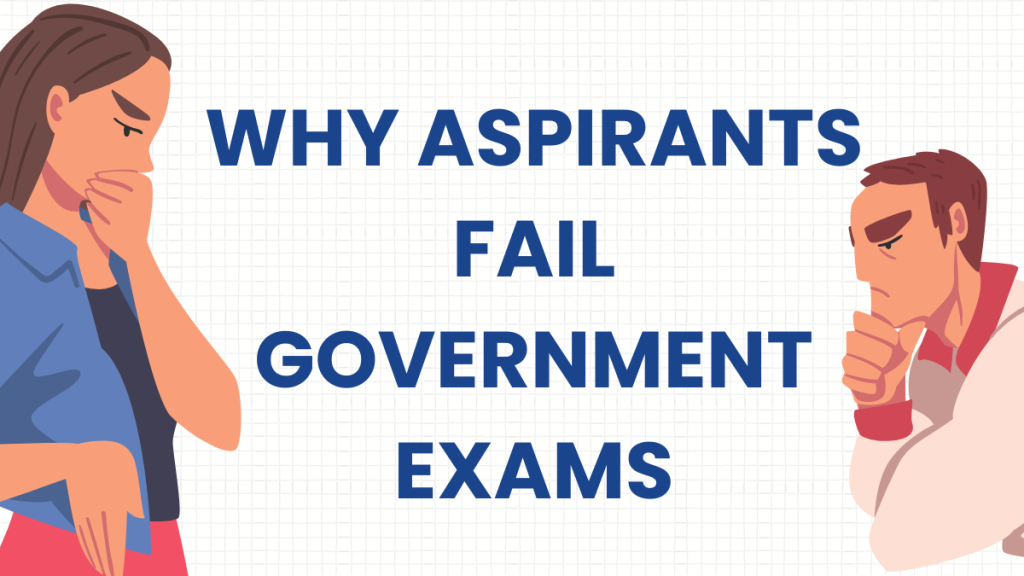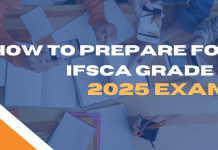In pursuing coveted government positions at the state or central level in India, the journey is laden with challenges, rigorous preparations, and a limited number of attempts dictated by the examination rules. While the allure of a secure government job captivates the aspirations of many, only a select few navigate the competitive landscape successfully. The competition, considered the crucible of success, often transforms into a fierce battleground, intensifying the struggle for those seeking employment in government sectors.
In this crucible of competition, candidates for various exams, such as IIT JEE, AIMPT/NEET, and higher secondary exams, engage in a relentless pursuit of excellence. In India, where competitive exams wield significant influence over a student’s future, the preparation process starts early, and the stakes are high. Unfortunately, the pressure to secure a favorable rank sometimes leads aspirants to lose sight of their own well-being in the relentless race for success.
This blog delves into the myriad challenges aspirants face in competitive exam preparation. From grappling with extensive syllabi to the intricacies of time management, candidates encounter many obstacles. However, avoiding succumbing to common pitfalls derailing the journey to success is crucial amidst the hustle. As we explore the nuances of competitive exam preparation, we’ll shed light on the mistakes aspirants should be wary of, ensuring a more balanced and sustainable approach to achieving their goals.

Government Jobs and their Appeal
In India, the Government sector serves as an expansive source of employment, annually presenting opportunities to thousands of candidates aspiring to secure government positions and enjoy the associated perks. Job security is paramount in the Government sector, furnishing employees with unparalleled stability—an invaluable assurance, particularly during job market uncertainties. Financial security further heightened the allure, as government jobs are renowned for competitive pay scales, perks, benefits, and allowances. These robust compensation packages act as a magnet, drawing candidates and significantly contributing to their overall job satisfaction.
The Government and Banking sectors command immense respect and are considered among the most esteemed industries. The prestige linked to being a government or banking employee adds an extra layer of gratification to the profession, extending beyond professional circles to become a source of pride for individuals and their families. An additional advantage is the coveted work-life balance that government employees enjoy. With clearly defined working hours and structured schedules, a harmonious equilibrium exists between professional responsibilities and personal life. This equilibrium ensures that employees fulfill their work commitments without compromising their personal well-being.
Beyond the obvious perks, acing competitive exams and landing a spot in a government, insurance, or banking gig is more than just a job—it’s a personal triumph. Going from hitting the books to joining a respected organization isn’t just about smarts; it’s a journey that screams dedication and capability, leaving you with a satisfying sense of accomplishment. Essentially, snagging a government job in India isn’t just about getting a gig; it’s a package deal that throws in job security, financial stability, a bit of status, work-life balance, and that warm fuzzy feeling of personal fulfillment. It’s the kind of career move that makes people sit up and take notice. Now, let’s dig into the nitty-gritty of the various Government Jobs up for grabs, giving you the lowdown on the exciting opportunities in the public sector.
| Categories | Exams |
| SSC (Staff Selection Commission) | SSC CGL (Combined Graduate Level Exam), SSC CHSL (Combined Higher Secondary Level), SSC JE (Junior Engineer), SSC CPO (Central Police Organisation), SSC GD (General Duty Constable)SSC MTS (Multi Tasking Staff), SSC Stenographer |
| RRB (Railway Recruitment Board) | RRB ALP (Assistant Loco Pilot), RRB NTPC (Non-Technical Popular Categories), RRB JE (Junior Engineer), RRB Grade D |
| UPSC (Union Public Service Commission) | UPSC CAPF (Central Armed Police Forces Assistant Commandant) |
| SBI (State Bank of India) | SBI PO (Probationary Officer)SBI SO (Specialist Officer)SBI Clerk (Junior Associate and Customer Support) |
| IBPS (Institute of Banking Personnel Selection) | IBPS PO (Probationary Officer), IBPS SO (Specialist Officer), IBPS Clerk, IBPS RRB (Regional Rural Bank Exam) |
| RBI (Reserve Bank of India) | RBI Grade B (Officer Scale), RBI Assistant |
| NIACL (New India Assurance Company Limited) | NIACL Assistant, NIACL AO (Administrative Officer) |
| NICL (National Insurance Company Limited) | NICL Exam |
| LIC (Life Insurance Corporation of India) | LIC AAO (Assistant Administrative Officer), LIC ADO (Apprentice Development Officer), LIC HFL (Housing Finance Limited) |
| FCI (Food Corporation of India) | FCI Manager Exam |
| Defense | National Defence Academy Exam (NDA), Combined Defence Service Exam (CDS), Air Force Common Admission Test (AFCAT) |
| NABARD (National Bank for Agriculture and Rural Development) | NABARD Exam |
| SIDBI (Small Industries Development Bank of India) | SIDBI Exam |
| IB (Intelligence Bureau) | Assistant Central Intelligence Officer in the Intelligence Bureau (ACIO IB) |
| CDSE (Combined Defence Services Examination) | Combined Defence Services Examination (CDSE) |
| IES (Indian Economic Exam Service) | Indian Economic Exam Service |
Common Syllabus for Government Exams
The curriculum for numerous government examinations such as SBI, RBI, IBPS, and NABARD encompasses diverse sections, each integral to a candidate’s comprehensive preparation. Within the quantitative aptitude section, questions delve into logical and non-verbal reasoning. The quantitative aptitude and data interpretation segment, often expansive and intricate, covers word problems, graphs, and simplification. To ensure preparedness, candidates must explore the quantitative aptitude page, providing a comprehensive breakdown and facilitating focused preparation, leveraging foundational knowledge in arithmetic and mathematics.
The English language/verbal ability section, a consistent component in government exams, requires meticulous attention due to the nuances of language rules. Aspirants should concentrate on grammar elements like tenses, prepositions, conjunctions, active/passive voice, and direct/indirect speech. Notably, this section may include descriptive tests, adding an additional layer of complexity. Another noteworthy section is computer knowledge, a manageable yet high-scoring part of the syllabus. Candidates can augment their basic computer knowledge through the provided links.
General awareness and current affairs, an omnipresent section in government exams, encompass an extensive syllabus. Questions may cover general knowledge, daily news, history, geography, politics, banking awareness, etc. Staying abreast of global events 4 to 5 months before the exam is pivotal. Aspirants can refer to the linked resources to fortify their preparation in this diverse and information-intensive section.
| Section | Topics |
| General Awareness | Monetary Policies, Banking & Financial Awareness, Economic Terms, Current Affairs, Static GK, Financial & Economics News, Government Schemes, Agreement & Deals, Banking terms, rates, processes, National Institution, Beepedia |
| Quantitative Aptitude | Time and Work, Mensuration, Average, Speed, Distance and Time, Mixture and Allegations, Permutation and Combination, Probability, Data Interpretation, Ratio & Proportion, Simplification & Approximation, Percentage, Set Theory, Data Interpretation, Quadratic Equation, Number Series, Profit & loss, Boats & Stream, Simple and Compound Interest, Data Sufficiency |
| Reasoning Ability | Puzzles, Seating Arrangement – Circular, Square and Linear, Data Sufficiency, Directions and Distance, Coding Decoding, Blood Relations, Inequality, Syllogism, Machine Input Output, Verbal Reasoning, Ordering and Ranking, Alphanumeric Series |
| English Language | Grammar, Vocabulary, Reading Comprehension, Passage Making, Error Spotting, Jumble Words, Sentence Framing, Fill in the Blanks, Cloze Test, Sentence Rearrangement, Idioms & Phrases |
| Computer Knowledge | Computer Languages, Basic Hardware and Software, History of Computer, Devices, Viruses and Hacking, MS Office, Networking |
Government Exams Failure: Top Reasons
In pursuing government employment in India, aspiring candidates face many challenges that extend beyond the confines of exam content. This comprehensive guide explores the multifaceted reasons candidates fail government exams, dissecting the common pitfalls hindering success.
- Lack of Preparation: One regular killer of candidates is inadequate preparation for each government exam. Approaching these examinations without a well-designed strategy is tantamount to entering a battlefield without any plan for confronting and overcoming the challenges (questions). Adequate preparation stands to be an absolute necessity, no less than a complete battle plan for any competitive endeavor. Absent this premise, candidates are always left to feel overwhelmed and incompetent.
- Lack of Practice: A means of ignorance amongst candidates is to think that they can solve any question and hence are qualified to give any government exam. However, those exams that are sternly difficult and seldom see any successful candidates deserve sustained and rigorous practice. Continuous practice is paramount to keep skills alive, give candidates an exposure of different options for solving a problem, and build mental toughness to face the challenges.
- Sudden Desire: That sudden determination to follow up on government jobs’ cause to make wrong career decisions, whose impetus again is the famous stories from bluebird candidates. It compares itself and becomes incapable of judging what should be the factors contributing to success. The circumstances of each individual, skills of each individual, and prerequisites for success are all unique. Following suit without question, adoption of somebody else’s pathway would prove to be nothing but regret and failure.
- Lack of Materials: Quality and quantity of study materials, as a major requirement for success, do exactly that in government exams. The right books, published by reputed publishers, assist candidates with solving problems accurately. Candidates should look for good reviews while sourcing materials, as those reviewed would at least cover topics related to the exams and would lend themselves to effective study.
- Not Being Aware of Notifications: Not being aware of exam notifications and being casual in checking for job offers can seriously harm one’s prospect. If it is last-minute awareness and applying without good time for preparation, it is usually risky. Candidates are advised to be alert about upcoming notifications so that they can plan and prepare themselves accordingly as to not fall in the problematic scenario of last-minute application without thorough preparation.
- Lack of Discipline: For success in competitive exams, discipline and perseverance hold the utmost importance. Having developed a self-disciplined study timetable while adhering to it, dictated by one’s own prioritization of subjects according to a structured plan, is what defines success, since all this aids him in maintaining pressure control and creating a conducive atmosphere for his learning and retention.
- Excessive distractions: compromise study time: Distractions, be it social media or any of the electronic devices, can be devastating for concentrated exam preparation. Students read success stories and are induced into distractions by external stimuli, neglecting their primary focus of study. One must sustain the momentum of study free from distractions by keeping their phone and all other devices aside.
- Peer Pressure: The ugly face of peer pressure, carving to meet family expectations and social norms, forces students to pursue courses that do not lie in their heart. Fitting in with external expectations instead of inner passion will surely take them down on the way to failure; rather, external forces should encourage students to do what they feel is right and provide the needed support to offset the effects of peer pressure on performance.
- Postponement of the Chapter: Postponement becomes an obstacle in adequate preparation for the exam especially concerning difficult chapters. If the student postpones the complex subjects in favor of relatively easier chapters, grasping all the necessary insights will contribute only to stress. If one study’s difficult chapters instead at an early stage, it would translate to better retention of the material, thereby allowing proper revision and less stress as the imminent exam draws near.
- Lack of Guidance: Going through a bumpy ride without proper guidance is all that students need to pass through when making crucial decisions such as choosing a course, planning study time, or deciding which college to attend. Instead, they should seek wise counsel from more experienced individuals or professionals; indeed, this provides students with insight and support. With the help of an experienced person, guidance helps streamline the choices for a student, dispel uncertainties, and facilitate the road to success leveraging the knowledge of someone who has walked the talk.
- Mental Health Issues: Students of lesser intelligence may hide numerous problems like learning disabilities, developmental disorders, or mental health problems. These problems, often overlooked due to academic proficiency, may push the students into burnout and ultimately lead to the failure of these students. Recognizing and adjourning mental health and learning challenges is therefore very significant in creating a supportive environment where all students, regardless of intelligence, can flourish.
- Systematic Failures: Systematic failures within the educational system may interfere with bright students’ performances. Lack of resources, lack of support tailored to students’ needs, and a one-size-fits-all approach may not address the needs of individuals. Therefore, discouragement may creep in, which eventually leads to failure. Resolving systemic failures and implementing a personalized support system is vital to create an inclusive and supportive educational environment that recognizes and nurtures the success of all students.
Some Preparation Strategies for Government Exams
- Understand the Exam Pattern and Syllabus: Start your preparation with a rigorous understanding of the exam pattern as well as the syllabus. Study some previous years’ question papers to analyze recurrent themes and topics that emerge. This will also provide some inkling about the examination’s orientation and design regarding your study plan.
- Prepare a Realistic Study Plan: Prepare a realistic and formatted study calendar, which is compatible with the exam date. Allot fixed timings for each subject, giving special emphasis to the weaker domains. A balanced plan ensures cover for every part of the syllabus and dispels any possibility of last-minute preparation.
- Prioritize Weak Areas: These weak areas should be attended to and prioritized. Put more hours into these to strengthen your weak foundations. Mastering the fundamentals of difficult subjects will, in turn, enhance overall performance, which can be very comforting during the exam.
- Use the Best Study Materials: Purchase only the best study materials from publishers who can justify their reputation. Pick your textbooks or online resources and practice papers with care, bearing in mind the relevant exam syllabus. Well-chosen materials are indeed half the battle for good learning and mastering important concepts.
- Practice: Practice makes any aspect of aspirant success in government exams. Solve ixambee’s previous years’ papers, take free mock tests, and practice regularly. Getting a better grip on the question pattern helps manage your time in the exam better, thus boosting your confidence.
- Stay Aware of Current Affairs: Current awareness and general awareness are part of many of the government examinations. Keeping yourself abreast with news nationally and internationally. To keep in touch with the world, read a newspaper, a magazine, or an online news portal every day.
- Reputed Coaching Institute: In case you feel you need additional guidance, joining a reputed coaching institute can help you. Seasoned faculty members and structured course programs can bring in valuable insights, exam strategies, and that extra edge to aid in your preparation.
- E-Learning Platforms: E-Learning platforms provide you with extra study material, video lectures, and interactive quizzes. Some sources like ixambee’s Online Courses will allow you to browse at your own convenience, meaning you can review tough areas or clarify any doubts at your own pace.
Summing Up
Pursuing government employment in India is a challenging yet rewarding journey. Aspirants must navigate a complex web of challenges, from exam preparation pitfalls to societal pressures and systemic issues. Understanding the reasons for exam failure and adopting effective preparation strategies are crucial steps toward success. Government jobs offer employment and a holistic package of security, financial stability, prestige, and personal fulfillment, making them highly sought-after in the Indian context.
Preparing for the SSC CHSL exam? ixamBee has got you covered! Practice with our SSC CHSL Tier 2 mock tests, analyze SSC CHSL Tier 1 PYP, and strengthen your concepts with the SSC SuperPack online course designed by experts. For a structured approach, enroll in our Target Banking Online Course and boost your chances of success. Start your SSC CHSL preparation with ixamBee today and stay ahead of the competition!
At ixamBee, we specialize in providing comprehensive online courses for government exams and online courses for government jobs. Our expertly designed courses for government jobs cater to a wide range of upcoming government exams. Whether you’re preparing for specific courses for government exams or seeking general guidance, ixamBee offers the resources like Beepedia previous year papers, SSC CGL, SSC CHSL, SSC MTS and other mock tests to succeed in exams like RBI Grade B, SEBI Grade A, NABARD Grade A, RRB NTPC, SSC MTS, NIACL Assistant, and more.
Also Read
Largest Tiger Reserves in India 2025| Top 10 State-Wise & Area-Wise List
Government Jobs After 12th Class – Check Post, Educational Qualification
List of Brands and their owner companies















